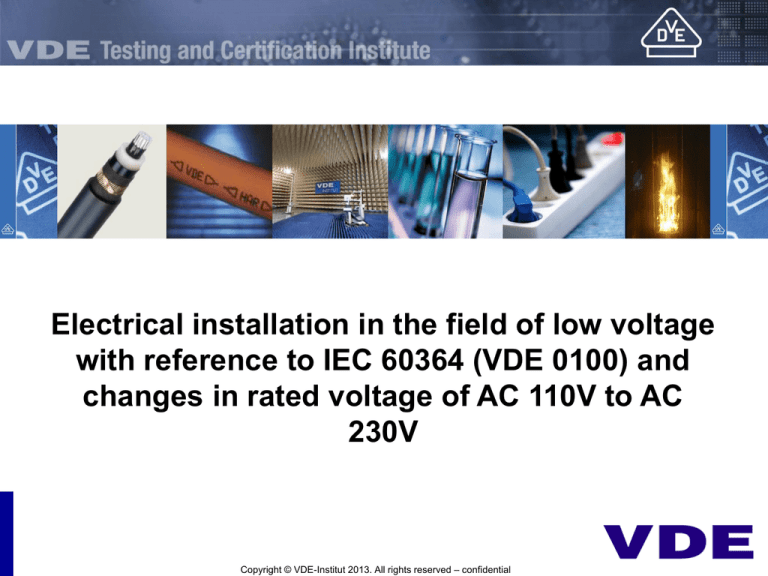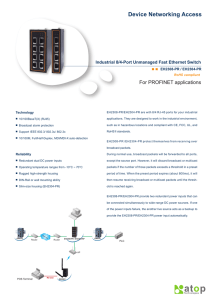
Electrical installation in the field of low voltage
with reference to IEC 60364 (VDE 0100) and
changes in rated voltage of AC 110V to AC
230V
Copyright © VDE-Institut 2013. All rights reserved – confidential
Overview
1.
2.
3.
4.
5.
6.
7.
8.
9.
Distribution network; Service connection
House connection box
System types; TN-C / TN-S
Protective equipotential bonding
Distribution Board; Meter
Distribution system; Components
Socket-outlets; Plugs
Equipment/Appliances
Possible impact caused on changing
the mains voltage from 120 V to 230 V
7.
8.
6.
2.
3.
4.
1.
Copyright © VDE-Institut 2013. All rights reserved – confidential
5.
TN-C Distribution Network
Exposed
conductive part
of an appliance
L1 L2 L3 N PE
For TN-C System see IEC 60364-1
TN-C system in which neutral and protective conductor functions
are combined in a single conductor throughout the system
Copyright © VDE-Institut 2013. All rights reserved – confidential
Service connection
Connection point
3/PEN AC 400V
Energy supply
company
House connection box
Property line
Measuring device
Consumer installation
Distribution board
3/PE/N AC 400V
Copyright © VDE-Institut 2013. All rights reserved – confidential
Service connection
- Legal framework in Germany
• Application necessary for service connection at energy supply company
• Technical conditions for connection to the low voltage systems (issued by
BDEW)
• Legal basis for the issuance of the technical conditions is the
Energiewirtschaftsgesetz (EnWG) and the
Niederspannungsanschlussverordnung (NAV)
• Dimensioning of the cables according to the requirements of the energy
supply company.
•
•
•
BDEW: Federal association of Energy and Water Industry
EnWG: Law on electricity and gas supply
NAV: Regulation on the connection to the low voltage network
Copyright © VDE-Institut 2013. All rights reserved – confidential
Service connection
- Cables
• Dimensioning of cables according to the specifications of the energy supply
company depending on the requirements of the erector (e.g. power
requirement of the building)
• Example: Copper cables to the house connection box of a single-family house
designed as three-phase a.c. network with cross-sectional area of at least 10
mm2 each (3/PEN/AC), e.g. cables of type NYY
• International Standard:
HD 516 Guide to use low voltage harmonized cables
• The requirements of the various cables are defined in the relevant product
standards for cables
Copyright © VDE-Institut 2013. All rights reserved – confidential
Service connection
- Cables
• HD 603 S1 Power cables - Part 603: Distribution cables of rated voltage
0,6/1 kV
• Requirements for cables of rated voltage Uo/U = 0,6/1 kV used in
underground power distribution systems, mainly for public distribution, of
nominal voltage not exceeding 0,6/1 kV a.c.
• Example:
Rated current-carrying capacity, cables in earth -> HD 603 Section 3-G,
Table 14
Copyright © VDE-Institut 2013. All rights reserved – confidential
Hausanschluss (2)
…..
Source: HD 603 S1 Part 3 Section G
Overview
1.
2.
3.
4.
5.
6.
7.
8.
9.
Distribution network; Service connection
House connection box
System types; TN-C / TN-S
Protective equipotential bonding
Distribution Board; Meter
Distribution system; Components
Socket-outlets; Plugs
Equipment/Appliances
Possible impact caused on changing
the mains voltage from 120 V to 230 V
7.
8.
6.
2.
3.
4.
1.
Copyright © VDE-Institut 2013. All rights reserved – confidential
5.
House connection box
• VDE 0660-505: (national
standard only)
Low-voltage switchgear and
controlgear assemblies – Part
505: Specification for house
connection boxes and
fuseboxes
Source: hager
Copyright © VDE-Institut 2013. All rights reserved – confidential
House connection box
- Transition to TN-S system
• The splitting of the PEN conductor into the protective conductor and neutral
conductor is usually realized in the service box (i.e. transition from TN-C
system to TN-S system)
• IEC 60364-4-44 ed. 2: Low-voltage electrical installations -Part 4-44:
Protection for safety - Protection against voltage disturbances and
electromagnetic disturbances
444.4.3.2 In existing buildings supplied from public low-voltage networks and which
contain, or are likely to contain, significant amounts of information technology
equipment, a TN-S system should be installed downstream of the origin of the
installation.
In newly constructed buildings, TN-S systems shall be installed downstream of the
origin of the installation.
Copyright © VDE-Institut 2013. All rights reserved – confidential
House connection box
- Transition to TN-S system
Distribution board
N
PE
L1 L2 L3
N PE
Main earthing terminal
House connection box
L1 L2 L3 PEN
Energy supply company
Foundation earth electrode
Copyright © VDE-Institut 2013. All rights reserved – confidential
Source: S. Rudnik, EMV-Fibel für Elektroniker,
Elektroinstallateure und Raumplaner
VDE-Schriftenreihe 55
NH fuse system
• IEC 60269-1: Low Voltage Fuses – Part 1
General requirements
• IEC 60269-2: Low Voltage Fuses – Part 2
Supplementary requirements for fuses for use
by authorized persons
• In the house connection box usually 3 NH fuses
are installed
• Provides protection against thermal and
dynamical overload of cables and cords
Source: hager
Copyright © VDE-Institut 2013. All rights reserved – confidential
Overview
1.
2.
3.
4.
5.
6.
7.
8.
9.
Distribution network; Service connection
House connection box
System types; TN-C / TN-S
Protective equipotential bonding
Distribution Board; Meter
Distribution system; Components
Socket-outlets; Plugs
Equipment/Appliances
Possible impact caused on changing
the mains voltage from 120 V to 230 V
7.
8.
6.
2.
3.
4.
1.
Copyright © VDE-Institut 2013. All rights reserved – confidential
5.
TN-C System
Fuses
L1
L2
L3
PEN
exposed-conductive-part
Term: Exposed-conductive-part (according to IEC 60364-5-54)
Conductive part of equipment which can be touched and which is not normally live, but which can
become live when basic insulation fails
Copyright © VDE-Institut 2013. All rights reserved – confidential
Protective function in TN-C System
Fuses
L1
L2
L3
PEN
RB
exposed-conductive-part
Copyright © VDE-Institut 2013. All rights reserved – confidential
TN-S System
RCD FUSES
IN=OUT
L1
L2
L3
N
PE
RB
RA
exposed-conductive-part
RCD: Residual current device
Copyright © VDE-Institut 2013. All rights reserved – confidential
Protective function of TN-S System
RCD FUSES
IN>OUT
L1
L2
L3
N
PE
RB
I diff ≥ 30 mA
RA
exposed-conductive-part
Copyright © VDE-Institut 2013. All rights reserved – confidential
Protection against electric shock
- Fundamental principles
•
•
•
IEC 61140 Protection against electric shock - Common aspects for
installation and equipment
This standard is intended to give fundamental principles and
requirements which are common to electrical installations, systems and
equipment for their co-ordination
The requirements of this standard apply only if they are incorporated ,
or are referred to, in the relevant standard. It is not intended to be used
as a stand-alone standard.
Copyright © VDE-Institut 2013. All rights reserved – confidential
Protection against electric shock
- Low voltage electrical installation
• IEC 60364-4-41: Low voltage electrical installation – protection for
safety – Protection against electric shock
• Part 4-41 of IEC 60364 deals with protection against electric shock as
applied to electrical installations.
• It specifies essential requirements regarding protection against electric
shock, including basic protection (protection against direct contact) and
fault protection (protection against indirect contact) of persons and
livestock.
• Basis for this standard is IEC 61140
Copyright © VDE-Institut 2013. All rights reserved – confidential
Overview
1.
2.
3.
4.
5.
6.
7.
8.
9.
Distribution network; Service connection
House connection box
System types; TN-C / TN-S
Protective equipotential bonding
Distribution Board; Meter
Distribution system; Components
Socket-outlets; Plugs
Equipment/Appliances
Possible impact caused on changing
the mains voltage from 120 V to 230 V
7.
8.
6.
2.
3.
4.
1.
Copyright © VDE-Institut 2013. All rights reserved – confidential
5.
Protective equipotential bonding
• In each building a so-called protective equipotential bonding has to be
realized via the main earthing terminal.
(see IEC 60364-4-41, 411.3.1)
• The equipotential bonding eliminates electric potential differences e.g.
between exposed-conductive parts, metallic pipes (gas, water) and
conductive parts of the building
• VDE 0618-1: (national standard only)
Equipotential busbar for main equipotential bonding
Source: Kopp Germany
Copyright © VDE-Institut 2013. All rights reserved – confidential
Protective equipotential bonding
W
Source: Kiefer, VDE0100 in der Praxis, VDE Verlag
Copyright © VDE-Institut 2013. All rights reserved – confidential
Overview
1.
2.
3.
4.
5.
6.
7.
8.
9.
Distribution network; Service connection
House connection box
System types; TN-C / TN-S
Protective equipotential bonding
Distribution Board; Meter
Distribution system; Components
Socket-outlets; Plugs
Equipment/Appliances
Possible impact caused on changing
the mains voltage from 120 V to 230 V
7.
8.
6.
2.
3.
4.
1.
Copyright © VDE-Institut 2013. All rights reserved – confidential
5.
Distribution board
Example:
Panel for protection and
switching installations
SH Switches
Source: hager
Electrical meters, e.g. for
• Primary supply by energy provider
• Renewable energy systems
• Heating pump
• E-Mobility
Copyright © VDE-Institut 2013. All rights reserved – confidential
Multimedia panel for
communication (internal and
external)
Distribution board
• VDE 0603-1 (only national standard)
Customer distribution board and meter panels
• IEC 61439-1
Low Voltage Switchgear and Control gear assembly – Part 1: General
requirements
• IEC 61439-3
Low Voltage Switchgear and Control gear assembly – Part 3: Distribution
boards intended to be operated by ordinary persons
• IEC 62208
Empty enclosures for Low Voltage Switchgears and control gear assemblies
Copyright © VDE-Institut 2013. All rights reserved – confidential
Static (electronic) meter
• Approval required according to Measuring Instruments Directive
2004/22/EC (MID)
• A Notified Body has to be involved for the conformity assessment procedure
• EN 50470 -1
Electricity metering equipment (a.c.) – Part 1: General requirements, tests
and test conditions -Metering equipment (class indexes A, B and C);
• EN 50470 -3
Electricity metering equipment (a.c.) – Part 3: Particular requirements Static meters for active energy (class indexes A, B and C);
• IEC 62052-31
Electricity metering equipment (AC) – General requirements, test and test
conditions - Part 31: Product safety requirements
Copyright © VDE-Institut 2013. All rights reserved – confidential
Overview
1.
2.
3.
4.
5.
6.
7.
8.
9.
Distribution network; Service connection
House connection box
System types; TN-C / TN-S
Protective equipotential bonding
Distribution Board; Meter
Distribution system; Components
Socket-outlets; Plugs
Equipment/Appliances
Possible impact caused on changing
the mains voltage from 120 V to 230 V
7.
8.
6.
2.
3.
4.
1.
Copyright © VDE-Institut 2013. All rights reserved – confidential
5.
Distribution system
• Assure selectivity by coordination of residual current protective devices
connected in series (VDE 0100-530, 535.2.2 *)
5 x 10 mm2 NYM
Apt. 1
5 x 10 mm2 NYM
Apt. 2
5 x 10 mm2 NYM
Apt. 3
Source: Hager
Distribution
board
* ) VDE 0100-530 (only national standard): Erection of low-voltage installations - Part 530:
Selection and erection of electrical equipment - Switchgear and controlgear
Copyright © VDE-Institut 2013. All rights reserved – confidential
Distribution system
– Residual Current Protective Device (RCD)
• Additional protection against electric shock by use of RCDs
• IEC 60364-4-41 Low voltage electrical installations Part 4-41: Protection for
safety – Protection against electric shock
• IEC 60364-4-41, clause 411.3.3 Additional protection
In a.c. systems, additional protection by means of a RCD in accordance with 415.1 shall be
provided for:
-
socket-outlets with a rated current not exceeding 20 A that are for use by ordinary persons
and are intended for general use and
-
Mobile equipment with a current rating not exceeding 32 A for use outdoors.
• The Use of RCDs is compulsory for all circuits in rooms containing bath or
shower (see IEC 60364-7-701 *)
*) IEC 60364-7-701 Low-voltage electrical installations - Part 7-701: Requirements for
special installations or locations - Locations containing a bath or shower
Copyright © VDE-Institut 2013. All rights reserved – confidential
Distribution system
– Residual Current Protective Device (RCD)
IEC 60354-4-41, clause 415.1
Additional protection: Residual current protective devices (RCDs)
•
The use of RCDs with a rated residual operating current not exceeding 30 mA, is
recognized in a.c. systems as additional protection in the event of falure of the
provision for basic protection and/or the provision for fault protection or
carelessness by users
•
The use of such devices is not recognized as a sole means of protection and does
not obviate the need to apply one of the protective measures specified in Clause
411 ff.
IEC/TR 60755 – General requirements for residual current operated
protective devices
Copyright © VDE-Institut 2013. All rights reserved – confidential
Circuit-breakers
• Circuit-breakers provide protection of cables against overload and shortcircuit
• IEC 60898-1: Electrical accessories – Circuit-breakers for overcurrent
protection for household and similar installations – Part 1: Circuitbreakers for a.c. operation
Source: ABB
Copyright © VDE-Institut 2013. All rights reserved – confidential
Distribution Systems
– Cables
• Dimensioning of cables according to the specifications depending on the
requirements of the erector (e.g. power requirement of the building)
• Example: Copper cables from the meter to the rooms of a single-family
house (or apartments of an apartment building) designed as three-phase
a.c. network with cross-sectional area of at least 10 mm2 each
(3/PE/N/AC), e.g. cables of type NYM
• International Standard:
HD 516 Guide to use of low voltage harmonized cables
• The requirements of the various cables are defined in the relevant
product standards for cables
Copyright © VDE-Institut 2013. All rights reserved – confidential
Distribution Systems
– Cables
• VDE 0298-3 (only national standard)
Application of cables and cords in power installations – Part 3: Guide to
use of non-harmonized cables
• VDE 0250-204 (only national standard)
Cables, wires and cords for power installation – PVC-Installation cable
NYM
• VDE 0298-4 (only national standard)
Application of cables and cords in power installations – Part 4:
Recommended current-carrying capacity for sheathed and nonsheathed
cables for fixed wirings in and around buildings and for flexible cables and
cords
Copyright © VDE-Institut 2013. All rights reserved – confidential
Distribution Systems
– Cables
• IEC 60227-4:
Polyvinyl chloride insulated cables of rated voltages up to and including
450/750 V – Part 4: Sheathed cables for fixed wiring
• IEC 60364-5-52 Low-voltage electrical installations – Part 5-52: Selection
and erection of electrical equipment – Wiring systems
e.g. this standard specifies the minimum cross-sectional area of
conductors (Section 524.1, Table 52.2)
Copyright © VDE-Institut 2013. All rights reserved – confidential
Overview
1.
2.
3.
4.
5.
6.
7.
8.
9.
Distribution network; Service connection
House connection box
System types; TN-C / TN-S
Protective equipotential bonding
Distribution Board; Meter
Distribution system; Components
Socket-outlets; Plugs
Equipment/Appliances
Possible impact caused on changing
the mains voltage from 120 V to 230 V
7.
8.
6.
2.
3.
4.
1.
Copyright © VDE-Institut 2013. All rights reserved – confidential
5.
Switches for fixed installation
• IEC 60669 Switches for household and similar fixed-electrical
installations
Part 1: General requirements
Part 2: Particular requirements – Electronic switches
Example: actuating switch (dimmer)
Source: Gira
Copyright © VDE-Institut 2013. All rights reserved – confidential
Fixed socket-outlets
• IEC 60884-1
Plugs and socket-outlets for household and similar purposes
– Part 1: General requirements
IEC 60884-1 applies to plugs and fixed or portable socket-outlets for a.c. only, with
or without earthing contact, with a rated voltage greater than 50 V but not exceeding 440 V
and a rated current not exceeding 32 A, intended for household and similar purposes, either
indoors or outdoors.
Copyright © VDE-Institut 2013. All rights reserved – confidential
Plugs
• IEC 60884-1
Plugs and socket-outlets for household and similar purposes
– Part 1: General requirements
IEC 60884-1 applies to plugs and fixed or portable socket-outlets for a.c. only, with
or without earthing contact, with a rated voltage greater than 50 V but not exceeding 440 V
and a rated current not exceeding 32 A, intended for household and similar purposes, either
indoors or outdoors.
Copyright © VDE-Institut 2013. All rights reserved – confidential
Plugs
– Examples
Rated values: 250 V, 16 A
With earthing contact
Rated values: 250 V, 2,5 A
Without earthing contact
IEC/TR 60083:
Plugs and socket-outlets for domestic and similar general use standardized in
member countries of IEC
Copyright © VDE-Institut 2013. All rights reserved – confidential
European two-pole plug
European standard EN 50075
German standard VDE 0620-101
• Flat, two pole plug
• without earthing contacts
• 2,5 A, 250 V a.c.
• only non rewirable
• for the connection of class-II equipment
Copyright © VDE-Institut 2013. All rights reserved – confidential
Overview
1.
2.
3.
4.
5.
6.
7.
8.
9.
Distribution network; Service connection
House connection box
System types; TN-C / TN-S
Protective equipotential bonding
Distribution Board; Meter
Distribution system; Components
Socket-outlets; plugs
Equipment/Appliances
Possible impact caused on changing
the mains voltage from 120 V to 230 V
7.
8.
6.
2.
3.
4.
1.
Copyright © VDE-Institut 2013. All rights reserved – confidential
5.
Appliances
• The safety requirements for equipment/appliances are described in the
relevant product safety standard
• Examples for product standards:
• IEC 60335 – Household and similar electrical appliances
• IEC 60065 – Audio, video and similar electronic apparatus – Safety
requirements
• IEC 60950 – Information technology equipment – Safety
• IEC 60601 – Medical electrical equipment
Copyright © VDE-Institut 2013. All rights reserved – confidential
Household Electrical Appliances
IEC 60335-1, Introduction
This standard recognizes the internationally accepted level of protection against
hazards such as electrical, mechanical, thermal, fire and radiation of appliances
when operated as in normal use taking into accoutn the manufacturer‘s
instructions. It also covers abnormal situations that can be expected in practice
and takes into account the way in which electromagnetic phenomena can affect
the safe operation of appliances.
This standard takes into account the requirements of IEC 60364 as far as possible
so that there is compatibility with the wiring rules when the appliance is connected
to the supply mains. However, national wiring rules may differ.
Copyright © VDE-Institut 2013. All rights reserved – confidential
Insulation coordination
The insulation coordination implies the selection of the electric
insulation characteristics of the equipment with regard to its
application and in relation to its surroundings.
Protection against direct contact (protection under normal
conditions)
• Direct contact: electric contact of persons or animals with
live parts
Protection against indirect contact (protection under fault
conditions)
• Indirect contact: Electric contact of persons or animals with
exposed-conductive parts which become live under fault
conditions
Copyright © VDE-Institut 2013. All rights reserved – confidential
Insulation coordination
• IEC 60664-1 Insulation coordination for equipment within low-voltage
systems; Part 1 – Principles, requirements and tests
• IEC 60664 has the status of a basic safety standard. It specifies the
basic requirements regarding clearances, creepage distances and solid
insulation.
• The specification of the requirements is done in the relevant safety
standard of the product, e.g. IEC 60335-1!
• In the case of missing specified values for clearance, creepage distances
and requirements for solid insulation in the relevant product standards
this standard is applicable.
Copyright © VDE-Institut 2013. All rights reserved – confidential
Types of insulation
• Basic insulation
Insulation of hazardous-live-parts which provides basic protection
• Supplementary insulation
Independent insulation applied in addition to basic insulation for fault
protection
• Double insulation
Insulation comprising both basic insulation and supplementary insulation
• Reinforced insulation
Insulation of hazardous-live-parts which provides a degree of protection
against electrical shock equivalent to double insulation
Source: IEC 60664-1
Copyright © VDE-Institut 2013. All rights reserved – confidential
Appliances related to protection classes
Protection class I
Basic insulation
and
Protective
conductor
Protection class II
Basic
insulation
and
or
Supplementary
insulation
Copyright © VDE-Institut 2013. All rights reserved – confidential
Reinforced
insulation
Appliances related to protection classes
Protection class
Symbol
Comment
0
─
Not allowed
I
Protective conductor
II
Protective insulation
III
III
Extra-low voltage (ELV)
Copyright © VDE-Institut 2013. All rights reserved – confidential
Overvoltage categories
Cat.
Description
Example
IV
Equipment for the use at the
origin of the installation
Electricity meters and primary protection
equipment
III
Equipment in fixed installations
and equipment with special
requirements regarding
reliability and availability
Installation equipment after the meter,
e.g. LS-Switches
II
Energy consuming equipment to
be supplied from the fixed
installation
Household appliances
Portable tools
Overvoltage category I:
Equipment for connection to circuits in which measures are taken to limit transient
overvoltages to an appropriately low level.
Source: IEC 60664-1
Copyright © VDE-Institut 2013. All rights reserved – confidential
Clearance and Creepage distance
• Requirements for equipment regarding their minimum insulation are
set in order to avoid risks.
• In particular, the equipment must be designed in a way that the
requirements regarding the minimum distances between conductive
parts are met.
• Clearance:
Shortest distance in air between two conductive parts
• Creepage distance
Shortest distance along the surface of the insulating material
between two conductive parts
IEC 60664-1 specifies the basic requirements regarding clearances and
creepage distances. The specification of the requirements is done in the
relevant safety standard of the product, e.g. IEC 60335-1.
Copyright © VDE-Institut 2013. All rights reserved – confidential
Pollution degree
• Depending on the field of application, equipment is exposed to different
environmental influences as, for example, humidity and dust.
• IEC 60664-1 defines four degrees of pollution in the micro-environment,
i.e. the immediate environment of the insulation which particularly
influences the dimensioning of the creepage distances:
From pollution degree 1 (the pollution has no influence) to pollution
degree 4 (continuous conductivity occurs due to conductive dust, rain or
other wet conditions)
• The requirements of clearance and creepage distances depend on the
pollution degrees.
Copyright © VDE-Institut 2013. All rights reserved – confidential
Material groups
• Requirements for creepage distances do not only depend on the
pollution degree but also on the properties of the insulating material
• With regard to tracking, insulating materials are categorized according
to the so-called Comparative Tracking Index (CTI).
• IEC 60664-1 defines four groups of insulating materials depending on
the CTI.
• The determination of the CTI is done in accordance with IEC 60112 –
Method for the determination of the proof and the comparative tracking
indices of solid insulating materials
Copyright © VDE-Institut 2013. All rights reserved – confidential
Overview
1.
2.
3.
4.
5.
6.
7.
8.
9.
Distribution network; Service connection
House connection box
System types; TN-C / TN-S
Protective equipotential bonding
Distribution Board; Meter
Distribution system; Components
Socket-outlets; plugs
Equipment/Appliances
Possible impact caused on changing
the mains voltage from 120 V to 230 V
7.
8.
6.
2.
3.
4.
1.
Copyright © VDE-Institut 2013. All rights reserved – confidential
5.
Possible impact when changing from 120 V
to 230 V
• New 230 V installations need smaller wire diameters at same power
consumption or higher power consumption of appliances is possible
with same wire diameter as in 120 V installations
• Implementing a TN-S installation with RCD devices increase the safety
of the user
Copyright © VDE-Institut 2013. All rights reserved – confidential
Possible impact when changing from 120 V
to 230 V
• Existing installations might not be sufficient in regard to insulation
demands of the wires used
• For the 230 V installation other fixed-socket outlets shall be used
compared to the 120 V installation to prevent damage on equipment
only accepting 120 V supply
• Equipment shall be designed for the 230 V installation
Copyright © VDE-Institut 2013. All rights reserved – confidential
Potential Hazards with current installation in
Saudi Arabia
• Found installation situation in Saudi Arabia
Copyright © VDE-Institut 2013. All rights reserved – confidential
Potential Hazards with current installation in
Saudi Arabia
• Found installation situation in Saudi Arabia
Copyright © VDE-Institut 2013. All rights reserved – confidential
Potential Hazards with current installation in
Saudi Arabia
• Found installation situation in Saudi Arabia
Copyright © VDE-Institut 2013. All rights reserved – confidential
Thank you very much!
Use our competence for your success
Copyright © VDE-Institut 2013. All rights reserved – confidential









